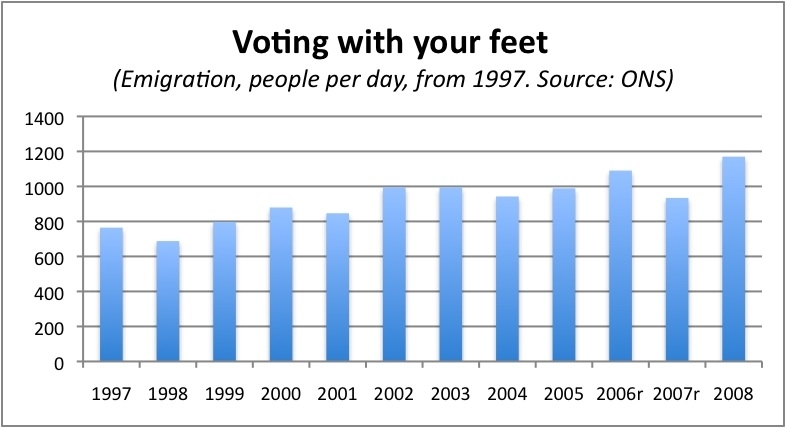Voting with one’s feet is always the most sincere sign of faith – or despair – in a country and its government. And for many the departure lounge, rather than the ballot box, is the surest route to better schools, lower tax and safer streets. The phrase “brain drain” was used in the 1970s and isn’t now – strange, because the emigration rate has doubled to 1,080 a day (ONS data here). It’s not just Brits: over the years, even the immigrants who have lived here for long enough are scarpering. But because of our obsession with immigration, we haven’t really paid attention to those leaving. And incomers do outnumber emigrants by about 3-2.
Interestingly, the exit has – over the years – been an even mix of British citizens and foreign nationals. This is not a story of Poles returning back home after a year of earning money in Britain’s devaluing currency. The data (compiled by clipboard survey) shows that about two-thirds of the emigrants haved live in Britain for more than four years.
Even more worrying, it’s those with high skills who scarper. An OECD study shows that more graduates have left Britain (1.3 million) than any other developed country (even America, which has five times our population). Amongst Brits deemed to have “high skills”, 15 percent have left to live abroad – the highest ratio in the developed world save for the notoriously itinerant Irish and Kiwis. Amongst Americans, it’s just 1 percent. This data (chart below) is from census a decade ago, so you can’t blame Labour. But the point holds: that Britain’s skills shortage would be addressed if we managed to persuade as many of our high skilled people to stay as America, Spain or France. We would have a fuller understanding of the oft-lamented “skills shortage” if our emigration levels were taken into account.








Comments